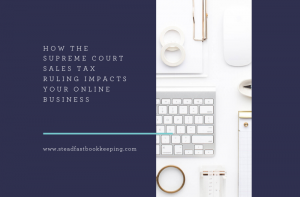
As an online shopper, you likely rejoice at the big fat zeros on the sales tax line when you order a virtual cart load of clothes, but all of that is changing. You might have heard of of the case South Dakota vs. Wayfair or read the articles about the Supreme Court sales tax ruling and how there are big changes coming for both consumers and online retailers.
South Dakota vs. Online Retailers
Back in 2016, South Dakota changed their sales tax law so that online retailers who met the states specific limitations had to collect, report and remit sales tax to the state even if the online retailer did not have a physical presence there. South Dakota wasn’t messing around, and after finding out that online retailers such as Wayfair, NewEgg and even some smaller websites were not collecting sales tax – they sued them.
On June 21, 2018, the Supreme Court ruled in favor of South Dakota. Prior to this ruling, an online retailer only had to worry about collecting sales tax from buyers in states where they had a physical presence such as an office, a warehouse or maybe even an employee – this is known as sales tax nexus. Many states are changing their sales tax laws so that online sellers are required to collect, report and remit sales tax even when they don’t have a physical presence in that state.
Who is Affected by This?
Any business who is truly operating as a business selling products online needs to pay special attention to this sales tax law. That includes anyone who meets the following criteria:
- e-commerce website like shopify, woo-commerce, etc.
- Amazon sellers
- Etsy sellers
- Those businesses who are selling a few thousand dollars a month or more in product
- Those businesses who are selling products to people all over the U.S.
Every online retailer should be aware of sales tax liability whether or not economic nexus impacts them right now or not.
You are probably thinking, “I’m no Wayfair and I’m not raking in millions of dollars in sales, so these states don’t care about me (the little guy), right?” Wrong. In a recent conversation with a sales tax expert who has been following this case very closely, he confirmed that these states care about everyone, even the little guys. They literally employ individuals to seek out online retailers and audit them to see whether they should be remitting sales tax to them or not. Crazy, right?
How can you stay compliant with economic sales tax nexus states?
#1 Consult a Professional
The best thing you can do to ensure compliance is consult a professional. A professional will be able to fully audit your online sales tax from the previous and current year to help determine your sales tax nexus. They will also be able to help you determine your physical presence sales tax nexus by analyzing employee, contractor, warehouse, FBA, inventory, and affiliate presence. Moreover, a professional will help you complete registration for sales tax licenses and give you detailed instructions on how and when to file for those states.
#2 Use software that helps you keep up with compliance
Choose an e-commerce website or merchant that has really good reporting and lets you export your sales data. Moreover, invest in a good bookkeeping system that can track sales tax liabilities and also provide detailed reports. Using the right softwares and systems can make all of the difference.
#3 Create a plan to stay on top of due dates and be sure to file and remit on time
Figure out how to login to the state website, how often you need to remit, all of the due dates, and the amounts required for each report. Set reminders for yourself and mark your calendars so you don’t miss a beat!
For more information, check out our other posts on sales tax: Ecommerce Sales Tax 101 and Ecommerce Sales Tax 201.
I am running a ecommerce site. Thanks for giving this information.
Thanks for reading!